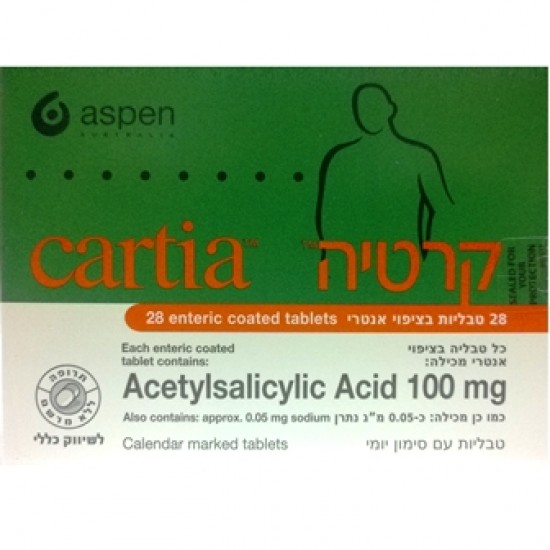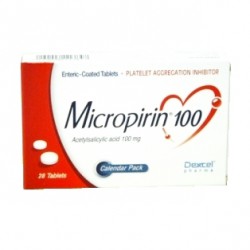Cartia

An anticoagulant which assists in the prevention of cardiovascular and cerebrovascular thrombotic events. Can be useful for people who are at risk of heart attack and stroke.
Active Ingredients
Each enteric coated tablet contains:
Acetylsalicylic Acid 100 mg
Indications
Therapeutic group:
Non-Steroidal Anti-Inflammatory.
Cartia is intended for the primary prevention of coronary heart disease in high-risk patients and for secondary prevention of arterial thrombotic cardiovascular and cerebrovascular diseases.
Cartia is an enteric coated (protected) tablet containing low-dose aspirin ( 100 mg ). Low-dose aspirin helps to reduce blood platelet aggregation and the tendency to blood clots.
Cartia may be useful if you are at risk of: angina, transient ischemic attacks (mini-strokes), stroke (due to a blood clot) or heart attacks if you already suffer from heart or blood vessel disease.
Instructions
Swallow the tablet whole with a glass of water. The medicine can be taken with or without food. Do not crush, chew, or halve the tablet. The tablet has an enteric (protective) coating, which prevents it from being released in the stomach and therefore reduces the risk of stomach problems. The aspirin continues through to the small intestine, where it is absorbed gradually into the bloodstream.
This medicine for the prevention of platelet aggregation is taken according to the doctor's instructions.
The usual dosage, unless otherwise instructed by a doctor, is one tablet per day, every day at the same time. Take the first tablet on the appropriately marked day and continue in the direction of the arrow. Taking Cartia at the same time during the day will help you not to forget to take the medicine.
Do not exceed the recommended dose.
Allow a lapse of at least two hours between taking this medicine and taking antacids for heartburn.
If you forgot to take this medicine at the required time, take the tablet as soon as you remember. In the case where you would take the next dose within 12 hours, skip the missed dose, and take the next dose at the scheduled time. Do not take a double dose to make up for a missed dose.
The dose of aspirin in Cartia is less than you would need to take for headache or other pain. If you need an additional painkiller for relief of these symptoms, it is recommended to take another medicine (e.g., paracetamol).
Warnings
Do not use Cartia if you are sensitive (allergic) to the active ingredient or to any of the other ingredients contained in the medicine or to other medicines from the same group.
If in the past you have felt unwell after taking aspirin, inform the doctor or pharmacist before taking the first dose.
The medicine is not intended for children and adolescents under 18 years of age.
Do not take the medicine if you are pregnant, plan on becoming pregnant, or think that you may be pregnant, unless the doctor has advised you otherwise. Do not take the medicine in the last trimester of pregnancy unless the doctor has advised you otherwise, and then the maximum daily dose should not exceed 100 mg. Regular use or treatment with a high dose of salicylic acid during the later months of pregnancy may cause serious complications in the health of the mother or the fetus.
Do not take the medicine if you are breastfeeding, as some of the salicylic acid may pass into breast milk, which may cause damage to your baby.
Do not take this medicine if you suffer, or have suffered in the past, from bleeding or blood clotting disorders (such as: hemophilia, Von Willebrand's disease or hypothrombinemia - bleeding due to decreased levels of clotting factors).
Do not use Cartia if you suffer, or have suffered, from stomach bleeding after treatment with aspirin or other non-steroidal anti-inflammatory medicines.
Do not use this medicine if you suffer from gastritis or an active or previous stomach ulcer.
Do not use this medicine if you suffer, or have suffered in the past, from gout.
Do not take the medicine if you suffer from severe kidney or liver problems.
Do not use this medicine in children and adolescents up to 20 years of age with fever-accompanying diseases such as the flu or chicken pox (for fear of Reye's syndrome).
It is preferable to minimize alcohol consumption during treatment with the medicine. If you consume 3 or more alcoholic beverages a day, consult the doctor whether you should use Cartia or use a different medicine, as this medicine may cause stomach bleeding.
Before using Cartia medicine, inform the doctor if:
- You suffer, or have suffered in the past, from asthma.
- You have bleeding tendency or are taking anticoagulants (such as warfarin).
- You suffer from kidney or liver problems.
- You have taken aspirin in the past and felt unwell.
- You suffer from hypertension or dehydration.
- Anticoagulants (such as heparin, warfarin)
- Other non-steroidal anti-inflammatory medicines, such as ibuprofen, used to treat pain or inflammation.
- Medicines used to treat gout (such as probenecid).
- Anti-inflammatory medicines (such as prednisone).
- Medicines for regulating blood pressure (such as medicines belonging to the beta-blocker group).
- Antidiabetic medicines of the sulphonylurea class.
- Medicines containing other salicylates or aspirin.
- Medicines containing methotrexate, chlorpropamide, sulphinpyrazone or spironolactone.
- Medicines containing corticosteroids.
- Valproic acid and phenytoin (for treatment of epilepsy).
- Medicines for the treatment of glaucoma (such as acetazolamide).
- Vasodilators of the angiotensin converting enzyme inhibitor type (ACE inhibitors) in order to lower blood pressure.
- SSRI antidepressants.
It is recommended to stop taking aspirin at least one week before undergoing surgery, including dental surgery or blood donation, as aspirin use prolongs the time for blood to clot, unless otherwise instructed by a doctor.
Use with caution in the elderly as this demographic group is more prone to side effects.
Use extreme caution while driving or operating dangerous machinery until it is clear to you how Cartia affects you. Carta may cause dizziness in certain people.
If you are taking, or have recently taken, other medicines, including non-prescription medicines and nutritional supplements, tell the doctor or pharmacist before commencing treatment in order to prevent hazards or lack of efficacy arising from drug interactions. It is especially important to inform the doctor or pharmacist if you are taking:
Please do not consider this information as an alternative to consulting your physician or pharmacist.
For further information on instructions for use, risks and side effects, please read the patient package insert and consult your doctor or pharmacist.
Read the patient package insert carefully before starting to take any medication.










